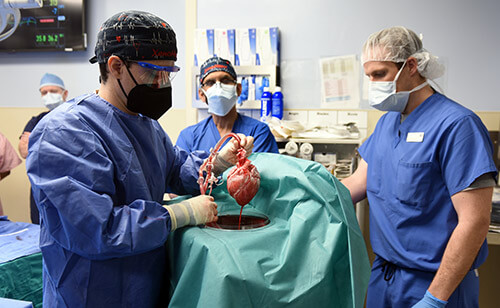
BALTIMORE — Medical researchers say the man who received a pig heart transplant died of heart failure, not from organ rejection. The groundbreaking procedure was the first ever to successfully use a genetically-modified organ from a pig in a human transplant surgery.
David Bennett, 57, received the xenotransplant surgery in January 2022, but died just two months later. University of Maryland School of Medicine faculty at the University of Maryland Medical Center performed the first-of-its-kind surgery.
According to researchers, who also conducted the autopsy, the pig heart functioned well for several weeks. Moreover, Bennett didn’t display any signs of rejection, which are a risk in any transplant surgery. Surgeons conclude Bennett died of heart failure, brought on by several complex factors.
“We are very encouraged by this finding, and it suggests that the genetically-modified pig heart and the experimental drug we used to prevent rejection worked effectively in tandem to demonstrate that xenotransplant can potentially save future lives,” says study co-leader Dr. Muhammed Mohiuddin, professor of surgery and program director of the Cardiac Xenotransplantation Program at UMSOM, in a university release.
Surgeons add that the factors contributing to Bennett’s heart failure included the use of intravenous immunoglobulin, a drug Bennett received twice during the second month after the transplant to prevent infection and rejection. The team believes the drug caused a reaction that damaged the heart muscle. Specifically, the drug contained antibodies against pig cells that may have interacted with the pig heart.
Did a virus in the heart seal the patient’s fate?
Surgeons also say Bennett’s new heart was infected with a latent pig virus called porcine cytomegalovirus. There’s no evidence that the virus caused an infection in the patient or infected any tissues or organs beyond the heart. However, researchers are still investigating if the virus caused damage to the transplanted heart or contributed to the patient’s heart failure.
“Our findings on autopsy did not show evidence of rejection,” says Dr. Bartley Griffith, study co-author and professor of surgery and The Thomas E. And Alice Marie Hales Distinguished Professor in Transplantation at UMSOM. “Instead, we saw a thickening and later stiffening of the heart muscle leading to diastolic heart failure, which means the heart muscle was not able to relax and fill the heart with blood as it is supposed to.”
Bennett received the pig heart on Jan. 7 because he did not qualify for a traditional heart transplant and was in end-stage heart failure. Before the transplant, he was bedridden for eight weeks with a life-threatening arrhythmia.
After receiving the transplant, doctors weaned Bennet off of a heart-lung bypass machine. The 57-year-old was participating in active rehabilitation for nearly two months prior to his death.
“We were incredibly encouraged by his progress. His heart was strong, almost too strong for his frail body, but he had a strong will to live. He told me he wanted to go home and see his dog, Lucky,” says Dr. Griffith.
According to organdonor.gov, 110,000 Americans are waiting for an organ transplant, and more than 6,000 patients die before receiving one.
The findings are published in the New England Journal of Medicine.

